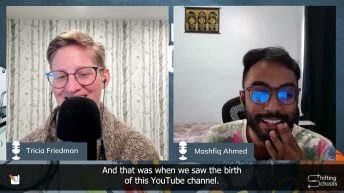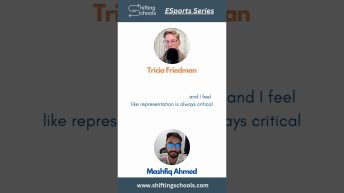Introductions
Jeff Nugent joined Jeff and David for tonight’s show.
|Essential Question|
How do adults learn?
David> See his blog post on which lists several factors we need to keep in mind when working with adult learners. And as with all learners, we must differentiate our instruction to meet their individual needs.
Jeff> We need to think about the following question:
What gets in the way of our veteran generation educators from going more public with their ideas and work?
Take away from the discussion>
-The forming of teacher cohorts focused around essential questions. Helps with feelings and fear of vulnerability. Building community, breaking down isolation. One might start with a book discussion then move into member offered topics and questions.
-How to support educators in taking risks?
-Form Professional Learning Networks (PLN) around different topics of interest to the members.
-Sustaining engagement and ongoing support is key.
-Creating a PLN and community in general is tougher in higher education. Having a physical and eventual digital space where folks can come together to form community is important.
-Adult learners wanting to be self directed and sometimes are overwhelmed by 2.0 learning tools.
-How do we support self-directed learning by minimizing some of the fear of leaving one’s comport zone? (Future EQ)
-Pre-service teacher education programs are so important. Build on these young adults’ natural inclination to socially connect and collaborate. There is a positive side to their sometimes very public nature of our youth and their social networking sites. 🙂
-What gets in the way of our older generation from going more public with their ideas and work? (Future EQ) Is this the nature of teachers?
-Backwards translation of our (IT/ET leaders) being way out there in blogging, Twitter, wikis, etc. to engage newcomers and overcome their pre-conceived notions of what these tools are about. Blogs are an example of folks thinking that you use them to tell your personal information only.
-Seeking to understand is central for the instructional/educational technologist. We are the “IT counselor†from time to time seeking to understand our teacher partners, their feelings about using technology and information tools and how they might take steps to find one or two that meet their needs. That human relation aspect of our job is huge.
|Blog Posts of the Week|
Jeff U: Webblogg-ed 2 Cents
Jeff N: Connectivism
David: Designed To Inspire
|Sign Off|
- Next show is next week from the EARCOS conference in Kuala Lumpur. Refer back to this site and Jeff’s The Thinking Stick main page for the date and time.
- Our guests will be teachers from around Asia.
- Essential Question for the show: How are you shifting?
- Don’t forget to post Web sites/blogs to the SOS Del.icio.us bookmarking site that support our upcoming EQ.



